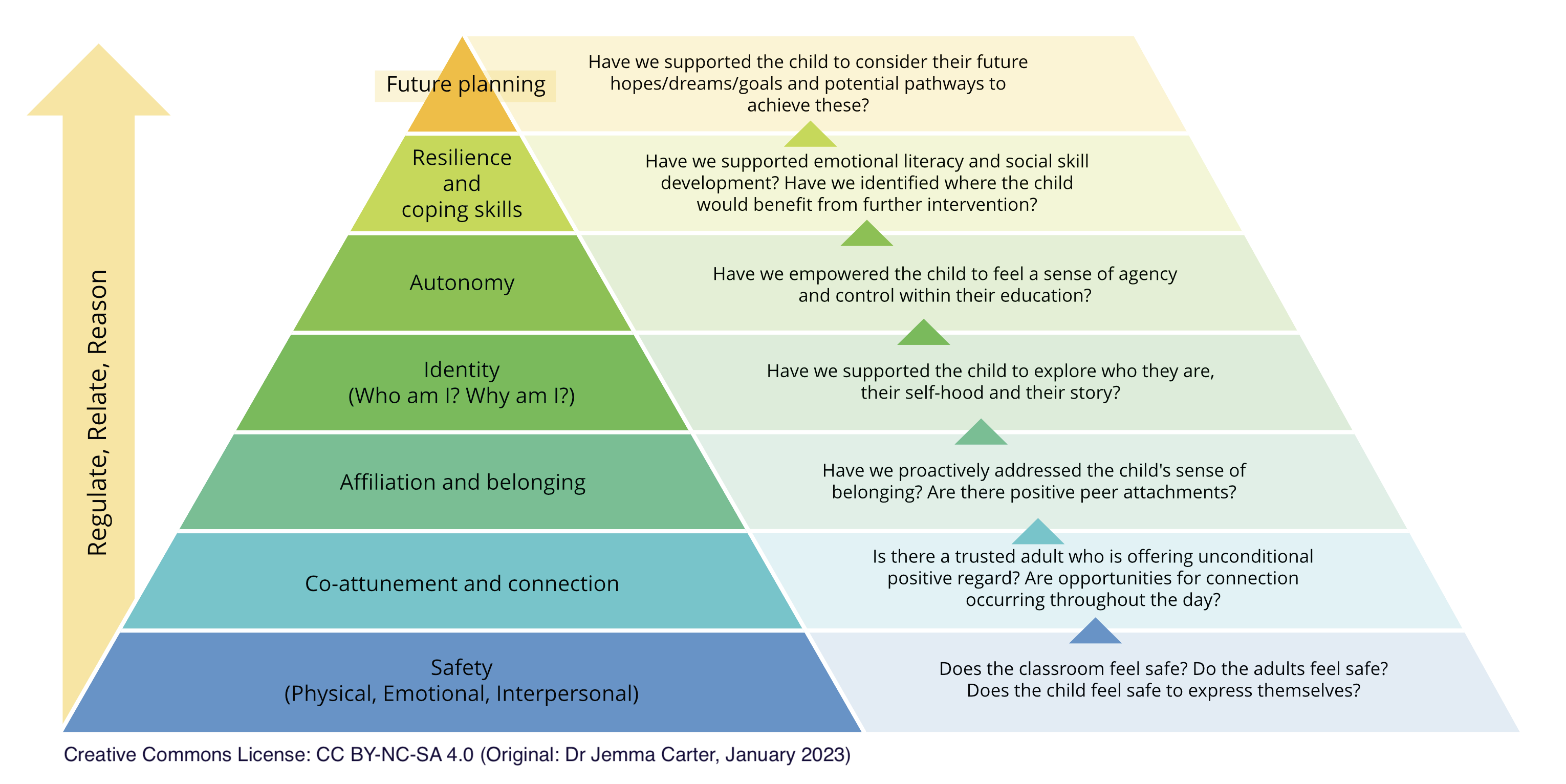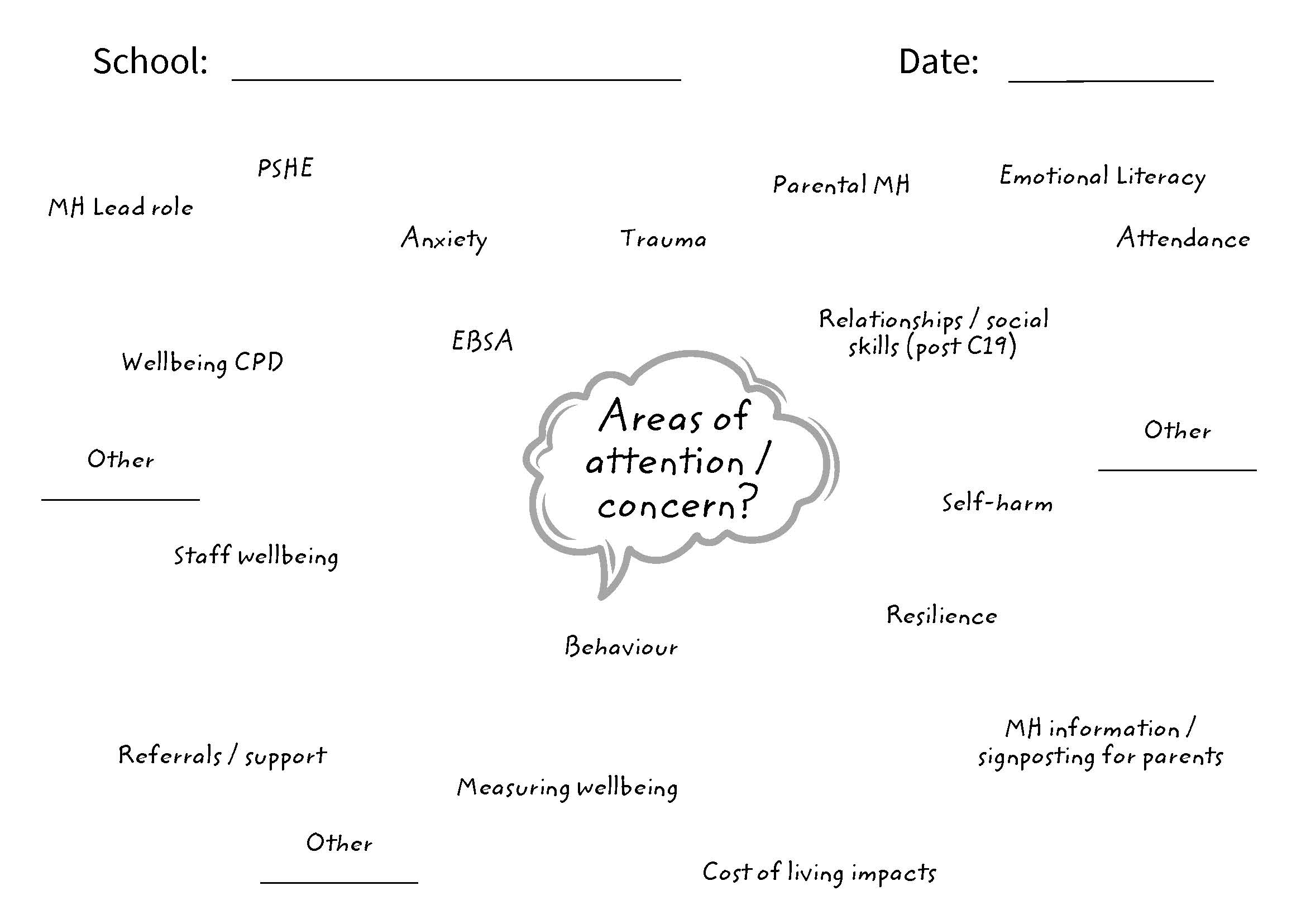 Whole School Approach - Self-reflection Tools
Whole School Approach - Self-reflection Tools
Here we provide information on / access to a range of audit tools we hope will meet a range of needs and support individual schools. We believe in an asset-based approach to audit - enabling you and the school community to recognise and celebrate what's in place and working well already... We also recognise that every school is different. This is why we include information on a range of approaches / tools.
"Start where you are. Use what you have. Do what you can"
For example - you could use this quick reflection as a starting poin for discussion...
We have also created some online tools freely available to schools :
A quick and easy 'Litmus Test'
Created by Dr Pooky Knightsmith in the Mentally Healthy Schools Workbook. Six Questions, 'gut reactions', on a scale of 1 to 10 and an opportunity to quickly engage and involve stakeholder groups - C&YP, staff, parents, governors et al that will help identify strengths and areas to focus on. and identify where the priorities of different stakeholders are. Plus an option to print a summary report saved each time you do it.

Rapid Self-Assessment
Slightly more in-depth that the Litmus Test focusing on some specific aspects of the PHE 8 priniciples and created with Cornwall in mind. A summary report is saved each tiime you complete the RSAT.
NB The online tool is only available to schools in Cornwall. Please contact us if you would like a login / password (using a school / setting e mail address)
Reflective Tools
SWAN Reflective Tool
Supportive, Welcoming, Altogether, Nurturing using a Graduated Response. A reflective tool for tricky times?
(originally developed by the Cornwall Education Psychology Service and Headstart Kernow as part of a post Covid Recovery Curriculum it has been updated as a conversation starter to help schools consider wellbeing in, what still feel like, turbulent times... )
The Resilience Framework / Academic Resilience
As huge fans of the Boingboing resilience framework we like the ARA.
The Academic Resilience Approach (ARA) is a whole-school-based community development model designed by Angie Hart and Lisa Williams with input from school practitioners and young people. It aims to equip schools with the tools to support students to overcome adversity and improve their mental health, and, in turn, educational outcomes. It is based on the Resilience Framework.
See our resilience page for some excellent resources linked to the ARA.
Other Tools
There are a huge range of resources and audit tools, e.g.
- the National Children’s Bureau (NCB) tool
- Leading Change, developed by the Anna Freud Centre
- TIS UK Self-assessment Implementation checklist for Protect, Relate, Regulate, Reflect
Tools for specific areas of wellbeing
Preventing and addressing Emotionally Based School Avoidance audit from Suffolk County Council (plus there is an excellent webinar / more resources as part of the Everybody's Business Series on the HSK Training page)
The Neurodiverse Classroom - Victoria Honeybourne (Book) - has an excellent and practical audit tool
Sensory Audit for Schools and Classrooms (Autism Education Trust / Education Scotland) - This sensory audit is to help staff to assess and create an environment that enables the participation of pupils with autism. It does not cover all aspects, but gives ideas on the ways in which a setting might be altered if pupils experience sensory processing difficulties and find it hard or very anxiety-provoking to tolerate certain sensations or situations. Pooky Knightsmith also has some excellent resources on sensory audits for schools.
The Applied Trauma Responsive Classroom Model (ATRCM)
Created by Dr Jemma Carter (2023)
Dr Jemma Carter is an EP. The ATRCM was created as a practical model to support classroom staff sequence their approaches and interventions with students in a trauma-responsive way. I had noticed that sequencing as a concept is often overlooked in responding to trauma, considering at what point we offer support and if this support is meeting the current needs of a child.
The ATRCM offers a framework to respond to a progressive set of needs, both through the visual model (below) and an additional observation and planning schedule.

Links / Downloads
Creating a trauma sensitive classroom - Link to article on EdPsy website
Using the Applied Trauma Responsive Classroom observation schedule Link to article on EdPsy website
Observation and planning schedule (Carter 2023) - link to Jemma's Google Docs
ATRCM visual (high res) - link to Jemma's Google Docs
PDf of article text and documents (ALL) - in case content moved / links broken (refer to original where possible - maybe updated in future)

